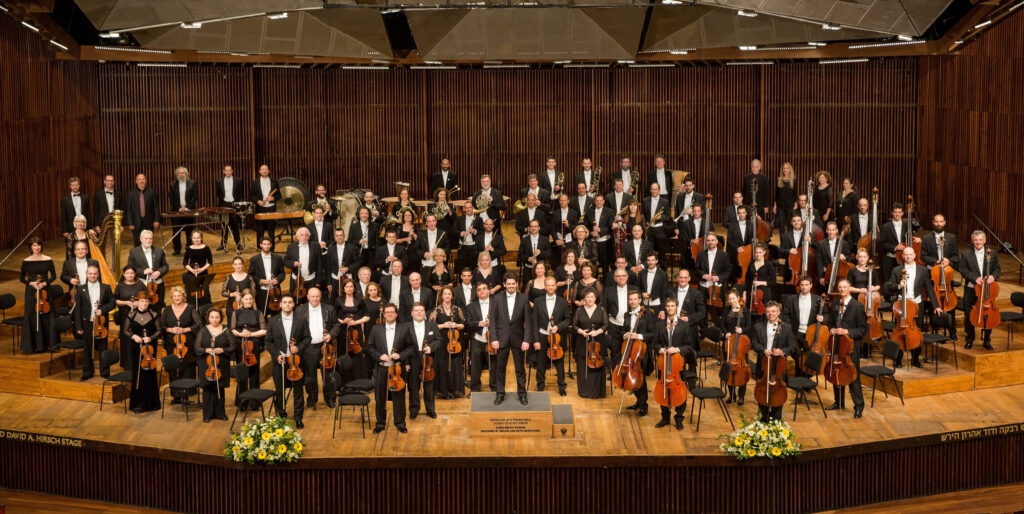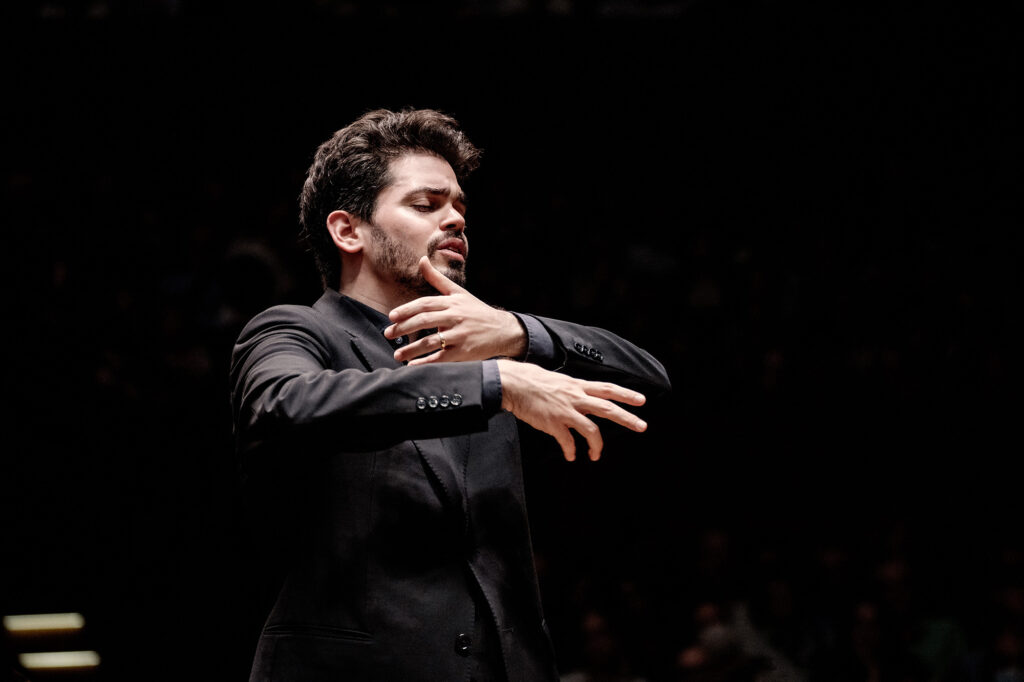
The Israel Philharmonic Orchestra with Lahav Shani © Oden Antman
This month, the Israel Philharmonic Orchestra embarks on a five-city tour of Florida and California, presented by American Friends of the Israel Philharmonic (AFIPO). Led by Music Director Lahav Shani, the tour marks the orchestra’s first return to the US since 2022. The programs will feature a selection of music by Avni, Bruch and Bernstein – all specifically written for the Jewish community – as well as works by Mendelssohn and Tchaikovsky.

© Marco Borggreve
In addition to holding the position of Music Director of the Israel Philharmonic since the 2020-2021 season, Lahav Shani is also Chief Conductor of the Rotterdam Philharmonic Orchestra, and as of the 2026-2027 season, he will become Chief Conductor of the Munich Philharmonic. He was previously Principal Guest Conductor of the Vienna Symphony Orchestra. The Berliner Morgenpost says of him: ”It scarcely seems possible to have a greater beauty of sound and joy in performance than that offered by Lahav Shani”.
The Israel Philharmonic was founded in 1936 by Polish violinist Bronislaw Huberman. Its home is the Charles Bronfman Auditorium in Tel Aviv, and the orchestra also performs across Israel as well as in Europe, Asia, North and South America.
Tzvi Avni is the composer of Prayer – for String Orchestra, a work written in 1961 in honor of Avni’s father who was killed in 1938 during the 1936–39 Arab Revolt. Tzvi Avni is one of Israel’s most prominent composers and a Professor Emeritus of the Jerusalem Academy of Music and Dance. His music is performed worldwide, and among the many awards he has received is the 2001 Israel Prize, the greatest honor bestowed upon an artist in Israel. Ronit Seter of the Jewish Music Research Centre, Jerusalem, and in Fairfax, Virginia, in the USA refers to Avni as “One of the most prominent voices of Israeli culture during the past six decades”, and “…. one of the most prolific—and most often performed—among Israeli composers”.
Max Bruch wrote Kol Nidrei – Adagio on Hebrew Melodies for Cello and Orchestra – in 1880, when he was Principal Conductor of the Liverpool Philharmonic Orchestra. Composed for Liverpool’s Jewish community, the sources of the music, according to the composer, are an age-old Hebrew song of atonement, and the middle section of a moving and truly magnificent song “O weep for those that wept on Babel’s stream”, from a poem by Lord Byron. The work takes its title from the powerful prayer recited on the holiest day on the Jewish calendar, Yom Kippur, with the solo cello evoking the lilting voice of the synagogue’s cantor.
Leonard Bernstein’s Halil, a Nocturne For Solo Flute, String Orchestra And Percussion, was written in 1981, and is dedicated “to the spirit of Yadin [Tenenbaum] and his fallen brothers.” Yadin Tanenbaum, an Israeli flute student, was killed in his tank close to the Suez Canal, on October 7, 1973, during the Yom Kippur war. “Halil” means “flute” in Hebrew, and the work’s solo flute part is performed on this tour by the orchestra’s Principal Flute, Guy Eshed. The work was premiered in 1981 by the Israel Philharmonic, conducted by Bernstein himself.
Mendelssohn’s Symphony No 3, Scottish, was dedicated to Queen Victoria. Mendelssohn took his inspiration from the now ruined palace where Queen Mary lived, and where she was crowned Queen of Scotland. On a visit to the palace the composer is quoted as saying: “Everything is broken and decayed, and the bright sky shines in. I believe that today I have found the beginning of my ‘Scottish’ Symphony”, which was completed in 1842.
Tchaikovsky’s sumptuous Fifth Symphony is described by biographer Anthony Holden as “…. his most mature masterpiece to date”, although proving, he says, that Tchaikovsky was “obsessed with the concept of Fate”, the theme of which seems to be carried throughout the work. The premiere performance took place in Saint Petersburg in November 1888 at a concert of the Saint Petersburg Philharmonic Society, conducted by the composer. It was enthusiastically received by the audience, if not by Tchaikovsky himself. He grew to love it, however, and it retains its place in the classical repertoire as one of his best loved works.
Tchaikovsky composed his Symphony No 6, Pathetique, in February and March 1893, and orchestrated it in July and August the same year. He meant for it to be enigmatic, saying in a letter to his nephew, Vladimir Davydov, that “…. it shall be entitled A Programme Symphony”. Although he experienced a degree of dissatisfaction with it, the first public performance took place on October 16 and 18, 1893, in Saint Petersburg, at the first symphony concert of the Russian Musical Society, with Tchaikovsky conducting. The Sixth Symphony is dedicated to Vladimir Davydov.
The Israel Philharmonic US Concert Tour, presented by American Friends of the Israel Philharmonic, takes place from March 19 – 27, 2025. Performances will be given in:
Miami, FL
Wednesday, March 19, 2025 at 8:00 pm
Adrienne Arsht Center for the Performing Arts
Avni: Prayer
, Bruch: Kol Nidrei
, Bernstein: Halil,
Tchaikovsky: Symphony No. 6
Concert information and tickets
West Palm Beach, FL
Thursday, March 20, 2025 at 7:30 pm
Kravis Center for the Performing Arts
Mendelssohn: Symphony No. 3 in A Minor, Scottish
,Tchaikovsky: Symphony No 5 in E Minor
Concert information and tickets
Palm Desert, CA
Saturday, March 22, 2025 at 7:30 pm
McCallum Theatre
Mendelssohn: Symphony No. 3 in A Minor, Scottish
, Tchaikovsky: Symphony No. 5 in E Minor
Concert information and tickets
San Francisco, CA
Sunday, March 23, 2025 at 7:30 pm
Davies Symphony Hall
Avni: Prayer
, Bruch: Kol Nidrei
, Bernstein: Halil
, Tchaikovsky: Symphony No 6
Concert information and tickets
Costa Mesa, CA
Wednesday, March 26, 2025 at 8:00 pm
Renee and Henry Segerstrom Concert Hall
Avni: Prayer
, Bruch: Kol Nidrei, Bernstein: Halil
, Tchaikovsky: Symphony No. 6
Concert tickets and information
There will be special benefit evenings in New York City on March 18, and Los Angeles on March 25. To learn more about these benefit evenings, visit AFIPO’s website.
Information sourced from:
Israel Philharmonic Orchestra program notes
Artists’ websites

Leave a Reply